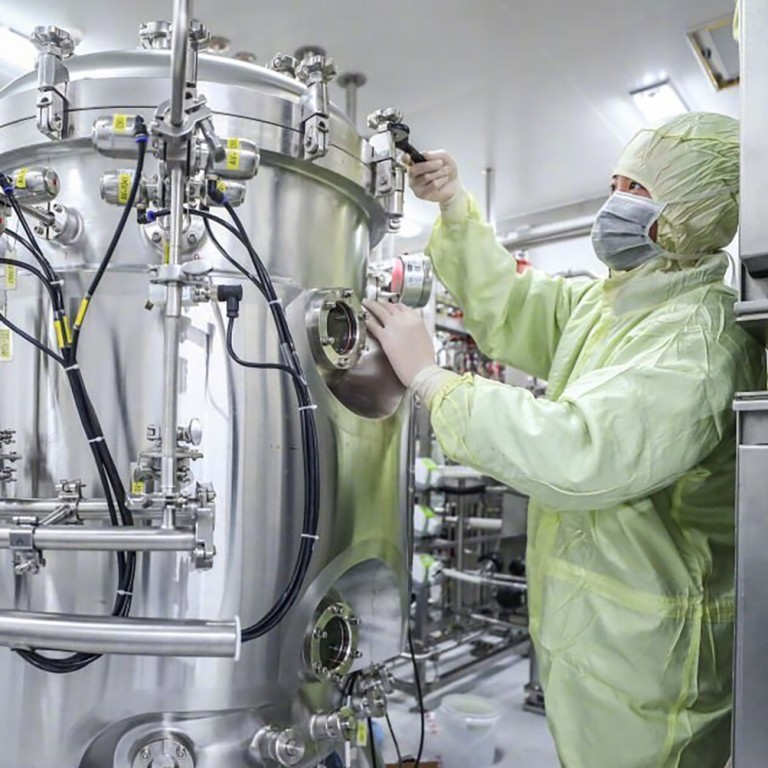
China building secure facilities to fast track coronavirus vaccine production
- The country currently has five candidate vaccines undergoing trials, four of which will need high levels of biosecurity to manufacture them safely
- The Chinese authorities are keen to begin mass production as quickly as possible
China is laying the groundwork to begin manufacturing Covid-19 vaccines as soon as they are given the green light.
Although the five drugs being developed by the country’s scientists are still months away from a full evaluation, secure facilities are already being built.
The facilities will have a biosecurity rating of 3, the second highest level, because Sars-CoV-2, the virus that causes Covid-19, is highly pathogenic and will need a secure environment if it used to make the vaccine.
Four of the five Chinese candidates are inactivated vaccines – a technique that involves killing the virus so that it cannot cause a serious infection but does stimulate an immune response and requires secure facilities.
The other Chinese vaccine, and five developed in other countries, are using genetic techniques that need lower levels of biosecurity because the actual Sars-CoV-2 virus is not used in the production process.
Take a shot, isolate at hotel: Chinese volunteer 048 describes Covid-19 vaccine trial
Phase 2 trials of the vaccines are expected to end in July, but there is a question mark over the phase 3 trials – which will need thousands of volunteers – because Covid-19 is no longer prevalent there.
Yet Chinese regulators and developers are still keen to develop the vaccines as quickly as possible.
Yu Qingming, party secretary of SinoPharm, a subsidiary of state-owned China National Pharmaceutical Group which owns China National Biotec Group (CNBG), said two facilities had been built at “wartime speed”.
Two CNBG subsidiaries – the Beijing Institute of Biological Products and Wuhan Institute of Biological Products – have designed inactivated vaccines that are undergoing phase 2 trials.
“The facility in Beijing has been completed and is in the process of qualifying for certification. The annual production capacity will be 100 million doses. The workshop in Wuhan has finished building the main structure … Its annual production capacity will be 80 million doses,” Yu said.

“After the two workshops begin production, they will effectively meet the need for large-scale inoculation and provide important guarantees over the availability and affordability of Covid-19 vaccines.”
Zhu Jingjin, party secretary of the CNBG, told state broadcaster CCTV last month this production capacity would meet the demands of “special population groups”, which he said included health workers, diplomatic staff, students studying abroad and people working on overseas infrastructure projects under the Belt and Road Initiative.
China has previously said it intends to vaccinate certain groups by the end of the year even if the trials have not finished.
Sinovac Research & Development, which recently received US$15 million in funding from two investors to boost the development of an inactivated vaccine dubbed CoronaVac, is also building a level 3 production facility in Beijing’s Daxing district.
The life or death question: who gets the Covid-19 vaccine?
The company said in a statement that it is in talks with the World Health Organisation and regulators of “relevant countries” over a phase three human trial.
The company hopes to be able to produce 100 million doses a year and plans to run production tests in July.
Drug makers whose vaccines have yet to reach the advanced trial stage are also building facilities.
Hualan Biological Engineering in Henan province and Kangtai Biological Products in the southern city of Shenzhen are both building level 3 facilities, according to the China Academy of Building Research.
The Institute of Medical Biology, Chinese Academy of Medical Sciences, whose inactivated vaccine is undergoing a phase 1 trial to check its is safe, is planning to build a similar facility later this year.
A vaccine expert who spoke on condition of anonymity because he was not authorised to speak to media said the drug regulator has been cutting red tape to ensure vaccines can be approved swiftly.
“Covid-19 has changed so much. Now the evaluation and review is calculated in hours, not days,” the expert said. “Sometimes site visits are done through video meetings to ensure efficiency.”
The expert said, even with China’s release system for vaccines – which requires every lot to be chemically and biologically tested before it is released – the extra workload can be handled with the current manpower.
“I wouldn’t worry about Covid-19 production or supply. The uncertainty is the quality of the vaccine itself,” the expert said.
Tianjin-based CanSino Biologics, which has developed a vaccine with military scientists, is planning to conduct its phase 3 trial in Canada.
China plans to start using coronavirus vaccine by end of year even if trials have not been completed
The vaccine, which uses a weakened common cold virus as a vector to introduce Sars-CoV-2’s genetic material into the body, will use the Canadian National Research Council’s facilities to mass produce the vaccine.
Elsewhere in the world, the US has teamed up with drugmaker AstraZeneca to make at least 300 million doses of a similar vaccine developed by the University of Oxford for delivery as early as this autumn.
American drugmaker Pfizer and German partner BioNTech, which are developing a vaccine using synthetic versions of the virus’s mRNA, hope to distribute 20 million doses by the end of this year if the US Food and Drug Administration gives it emergency authorisation.

